Facilitate rigorous, language-rich, standards-based instruction every day
Welcome to our English Language Development Curriculum
Reading Practice & Instruction
Multilingual learners need more purposeful, guided reading practice. In fact, reading scores for this unique student population are far below the national average. It's time to respond to this data and boost academic reading skills and performance on state and local exams by explicitly teaching and practicing reading standards every day.
- facilitate reading lessons aligned to ELD standards (20-60 minutes of designated ELD every day).
- provide up to 60 minutes of online, adaptive reading practice each week.
- increase access to grade-level content through text summaries, leveled texts, and text-to-speech.
- auto-grade close reading tasks.
- build reading fluency and stamina.
- deliver lessons with confidence with step-by-step teacher guides and pedagogically sound teacher moves on how to best implement designated ELD instruction.
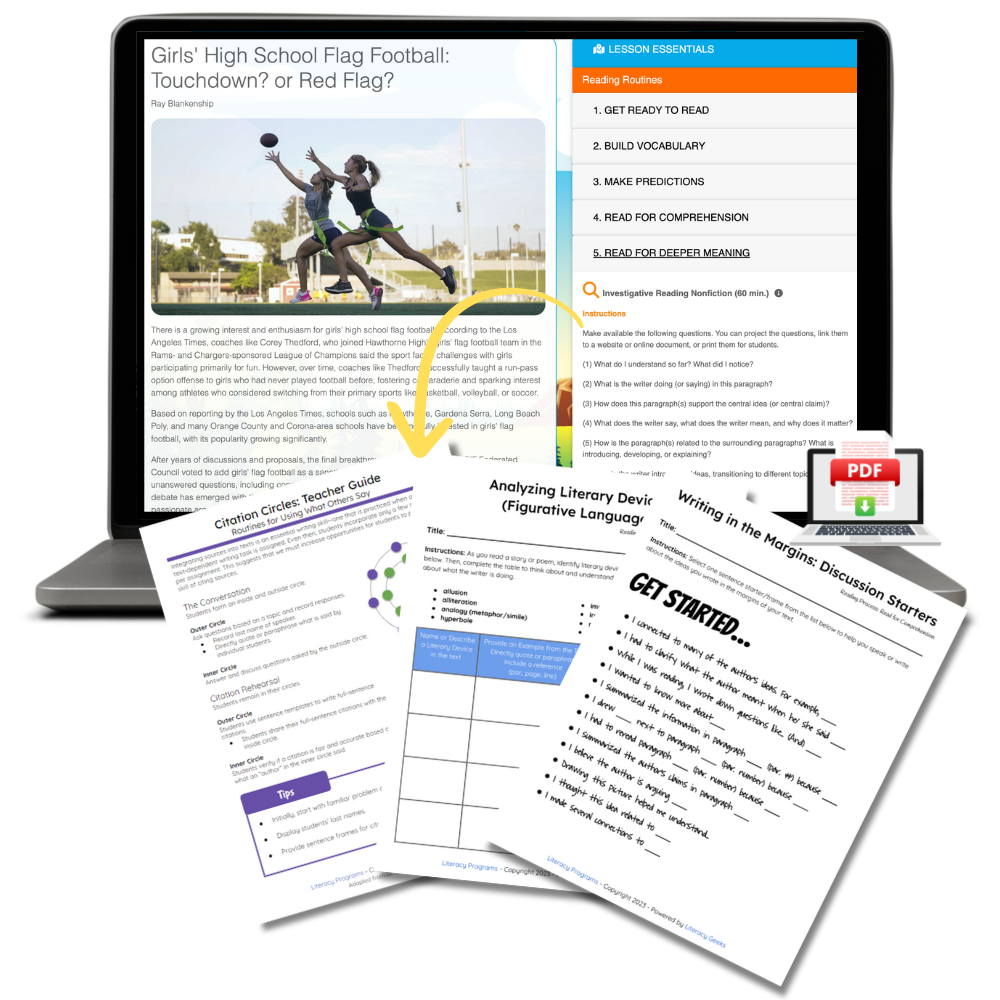
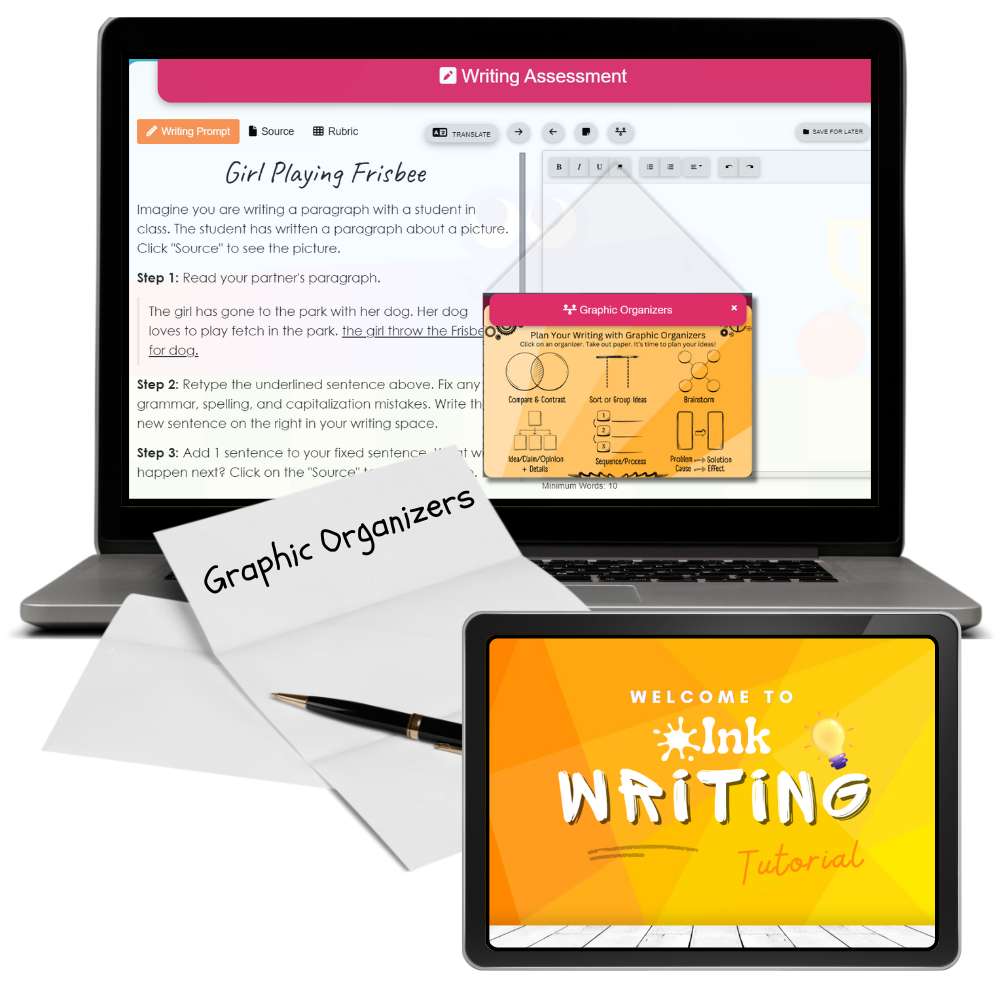
Writing Practice & Instruction
Multilingual learners often struggle with writing, especially when integrating sources, and their writing skills continue to lag far behind their English-speaking peers. We can change this alarming statistic if we: (1) increase opportunities for multilingual students to practice writing; (2) provide timely and relevant feedback; and (3) explicitly teach how language works.
With our Writing ELD Curriculum you can...
- ensure writing instruction directly aligns to ELD standards.
- practice state writing assessment question types in preparation for reclassification.
- practice short writing tasks and full length essays in various writing types like opinion, descriptive, narrative, and informative writing every week.
- be data-driven with auto-grading, allowing teachers to focus their energy and time on explicit, skill-based instruction.
- facilitate common writing assessments for all multilingual students in a school or across a district.
Recursive Literacy Routines
Recursive literacy routines create a powerful framework for ongoing, spiraled skill development. By consistently revisiting key learning strategies and essential literacy skills, students deepen their understanding and boost their confidence in their abilities.
- instill confidence in multilingual students through predictable routines so they can focus on what to learn and not how to learn.
- offer embedded support for all learners.
- respond to multiple intelligences in the classroom, including visual, auditory, kinesthetic, interpersonal, and linguistic-verbal.
- establish effective routines for essential academic skills like analyzing prompts, building vocabulary, enhancing reading comprehension, and improving writing and speaking skills.
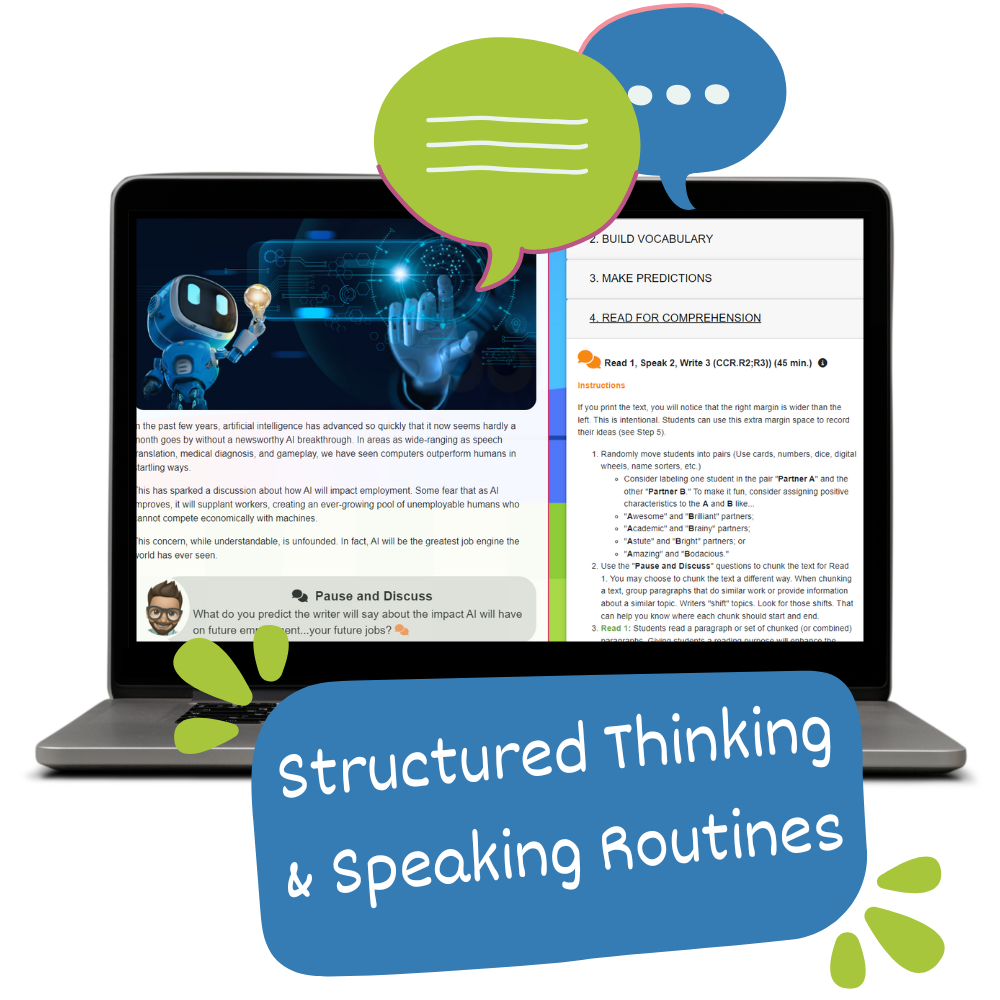
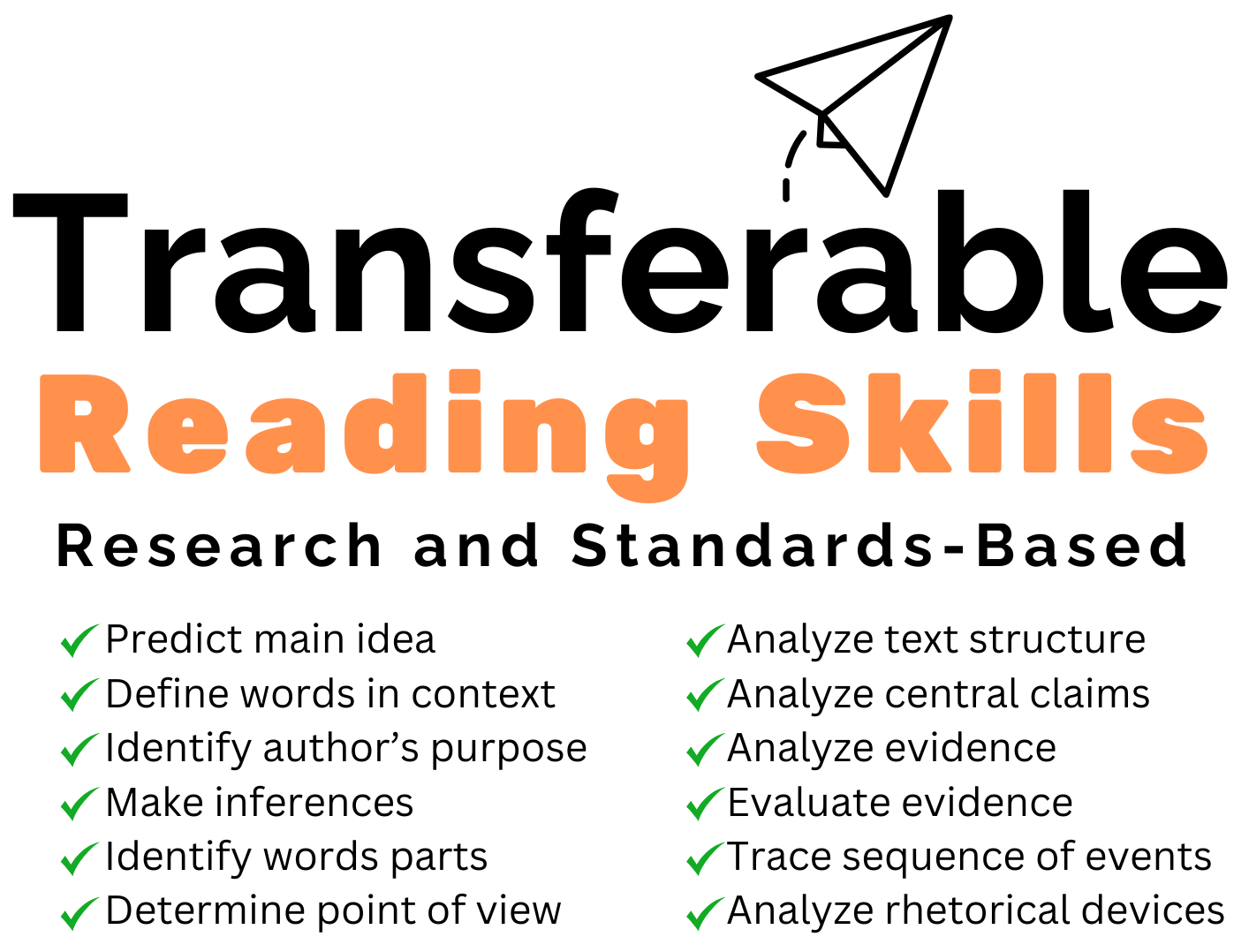
Skills and Process Over Product
Our approach emphasizes the development of essential literacy skills and standards through dynamic reading lessons. By focusing on the process of learning, students cultivate grade-level reading skills. These skills are not only transferable to other classes but also form the foundation for future academic success.
- enhance multilingual students' abilities to deconstruct complex texts and articulate sophisticated analyses in their writing.
- develop essential "habits of mind" of good readers so students can use close reading skills independently.
- implement a research-based reading process that ensures students can read independently and strategically with high levels of success.
Impactful Instructional Practices for Multilingual Learners
High Expectations
Setting high expectations with the appropriate support is critical for engagement, growth, and confidence.
Culturally Relevant
Our culturally relevant ELD curriculum makes learning meaningful and engaging and promotes critical thinking.
Spiraled Instruction
Rehearse skills and gradually increase complexity, accelerating learning through repetition and practice.
Assign Single Lessons or Units
As part of our ELD curriculum, teachers have the flexibility to assign single lessons or themed units.
Assigning a lesson to a class is a snap! Teachers can preview the standards and outcomes for the lesson, review the skills that will be taught, and go through the pre-reading, during reading, and post reading activities. If a teacher wants to teach the lesson, all they have to do is click "Assign to Class."
Students will see the lesson in their Assignments list.
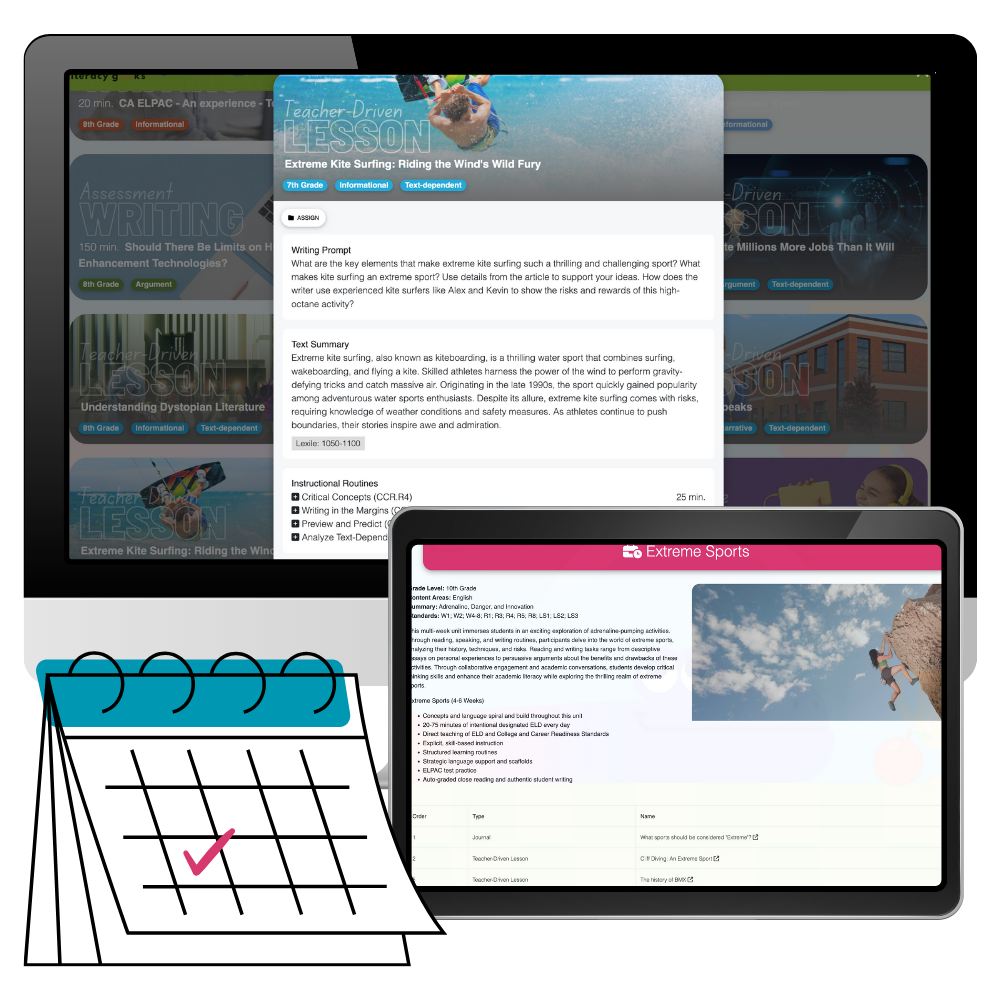

Routine-based Learning
Our innovative recursive learning routines that are the backbone of our ELD curriculum foster a strong sense of community among learners and offer a structured approach that helps students anticipate the next steps, thereby reducing anxiety and enhancing focus. Each routine includes clear, detailed instructions, ensuring that students feel confident at every stage, promoting independence and responsibility as they take charge of their learning journey. Our routines accommodate various learning styles by incorporating visual, auditory, and kinesthetic methods, adhering to English learner best practices.
Thoughtful Vocabulary Instruction
Every lesson in our ELD curriculum offers a rich, immersive experience that teaches essential grade-level vocabulary within context. Students start by learning key concepts vital to understanding the text. Through engaging activities such as visual representations, skits, and wordplay, they explore and master new vocabulary. Students then enhance their learning by identifying unfamiliar words in their readings. Our Pinpoint Language Discovery tool defines unfamiliar words in context and provides additional information, helping students grasp not only the meaning but also the usage of each word.
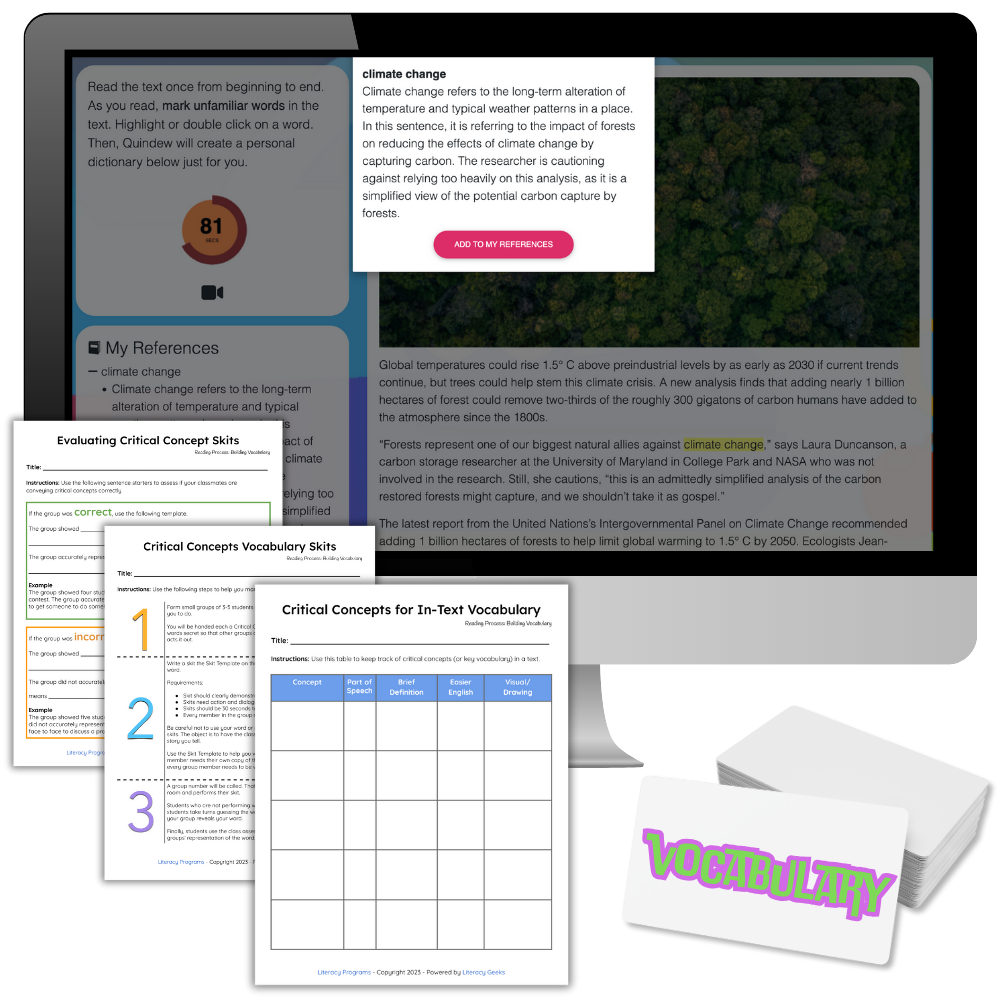
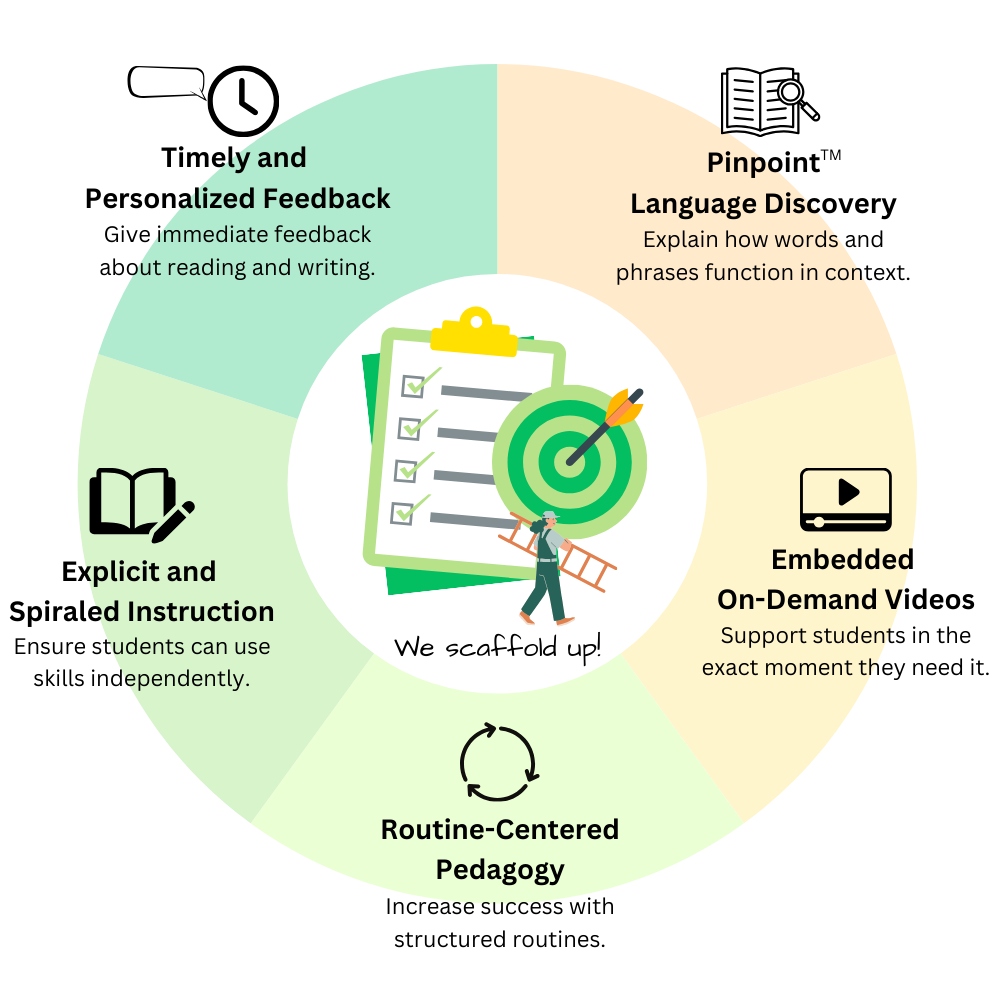
We Scaffold Up
Our scaffolds give multilingual learners greater access to grade-level content because we design instruction so students can meet our highest expectations.
When you "scaffold up," you can...
- support vocabulary and language development with our Pinpoint Language Discovery tool that explains how words and phrases function in context.
- increase access for various student groups with text summaries, leveled texts, and text-to-speech.
- Timely and personalized feedback about close reading skills.
- promote academic language development with sentence frames that guide students to think about texts in complex ways.
- easily facilitate pair and small group discussions about text.
Our Reading Lessons Have 8 Key Teacher Moves!
Lesson Essentials
Each lesson provides a clear text summary, an essential question (EQ), Lexile reading level, and options for customizing support like turning on embedded discussion questions and text-leveling.
Get Ready to Read
Each lesson begins with a prompt that students analyze. The prompt explains what students should be focused on while reading; and it can be used for text-dependent writing practice and instruction.
Build Vocabulary
There are numerous opportunities to build vocabulary in each lesson. During this step in the process, students study critical concepts and "play" with various grade-level vocabulary words from the text.
Make Predictions
Complete this step before or after our vocabulary activities. Students study the image at the top of the article, read the first and last paragraphs, and make a prediction about the text's topic and structure
Comprehension
Once students mark their prompts, explore vocabulary, and make predictions, they are ready to start a reading comprehsion routine. Our comprehension routines are highly structured and engaging.
Analysis
Most of our lessons have analytical routines called Reading for Deeper Meaning. These routines ask students to go beyond what an author says and look closely at what an author does in a text.
Review
There are opportunities in each lesson to review key components. There are vocabulary review activities, comprehension questions that we recommend doing in groups, and summary activites.
Reading to Write
Each lesson offers post-reading activities that teach specific writing skills like integrating sources and a text-dependent writing assignment that follows a standards-based process...that we grade!
Multilingual Learner Program (MLL)
Newcomer
Curriculum
Empowering newcomers through differentiated, asset-minded curriculum and resources for middle and high school.
ELD
Curriculum
Accelerate English language development for multilingual learners with structured reading, speaking & writing curriculum.
LTEL
Curriculum
Address the unique needs of Long-Term English Learners with rigorous and engaging grade-level reading and writing curriculum.